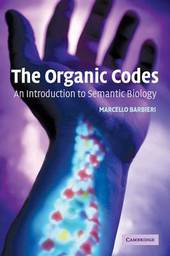
|
The Organic Codes: An Introduction to Semantic Biology
Paperback / softback
Main Details
| Title |
The Organic Codes: An Introduction to Semantic Biology
|
| Authors and Contributors |
By (author) Marcello Barbieri
|
| Physical Properties |
| Format:Paperback / softback | | Pages:316 | | Dimensions(mm): Height 229,Width 152 |
|
| Category/Genre | Cellular biology (cytology)
Palaeontology |
|---|
| ISBN/Barcode |
9780521531009
|
| Classifications | Dewey:570.1 570.1 |
|---|
| Audience | | Professional & Vocational | | General | |
|---|
| Illustrations |
1 Halftones, unspecified; 46 Line drawings, unspecified
|
|
Publishing Details |
| Publisher |
Cambridge University Press
|
| Imprint |
Cambridge University Press
|
| Publication Date |
23 December 2002 |
| Publication Country |
United Kingdom
|
Description
The genetic code appeared on Earth with the first cells. The codes of cultural evolution arrived almost four billion years later. These are the only codes that are recognized by modern biology. In this book, however, Marcello Barbieri explains that there are many more organic codes in nature, and their appearance not only took place throughout the history of life but marked the major steps of that history. A code establishes a correspondence between two independent 'worlds', and the codemaker is a third party between those 'worlds'. Therefore the cell can be thought of as a trinity of genotype, phenotype and ribotype. The ancestral ribotypes were the agents which gave rise to the first cells. The book goes on to explain how organic codes and organic memories can be used to shed new light on the problems encountered in cell signalling, epigenesis, embryonic development, and the evolution of language.
Author Biography
Professor Barbieri is based in the Department of Morphology and Embryology at the University of Ferrara, Italy.
ReviewsAdvance praise: 'It looked so intriguing that I started reading it on the way home. Luckily for me, the bus was late... It is really fascinating.' Noam Chomsky, Massachusetts Institute of Technology 'I'm reading it almost as if it were a thriller.' Abraham Minsky, The Weizman Institute of Science '... truly stimulating ... clear and succinct, and the content genuinely novel.' Robert Aunger, University of Cambridge From the Foreword by Michael Ghiselin: 'It belongs to the mainstream of biological thought, and finds its proper place among the works of Karl Ernst von Baer, Charles Darwin, and August Weismann.' ' ... this is a recommended read for anyone from 'A' level and upwards, if only because it might well spark off some new directions for both researchers and students.' Focus
|